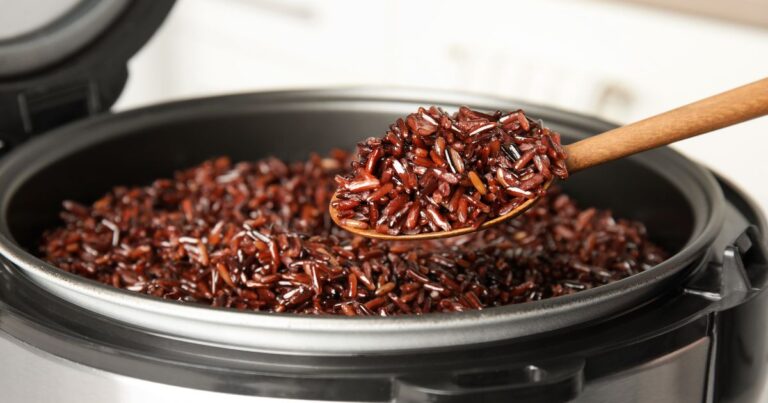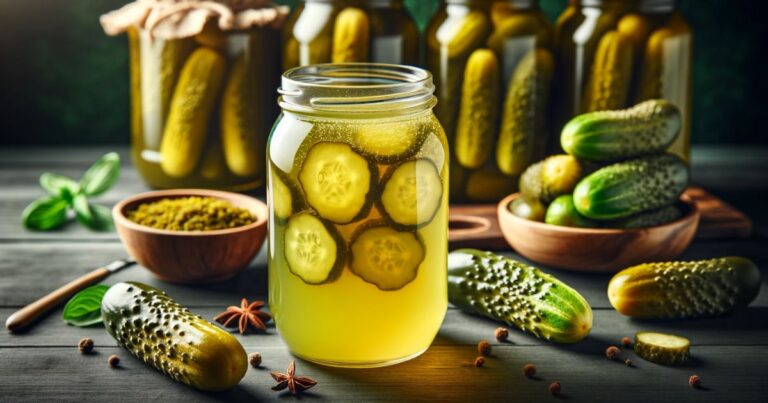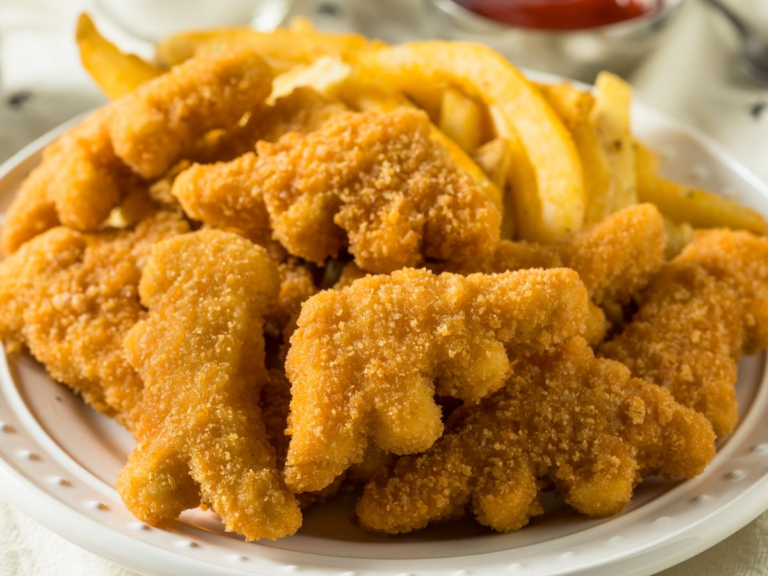The Top 7 Reasons We Crave Tuna Fish: I Need To Eat Tuna Right Now
When it comes to food cravings, I have to admit some of them might come as a shock, but then again, everyone has different cravings for different reasons at different times in life, depending on the connection of signals your body sends to your brain. Why Am I Craving Tuna? Let’s find out the top seven reasons why someone would have intense tuna cravings.
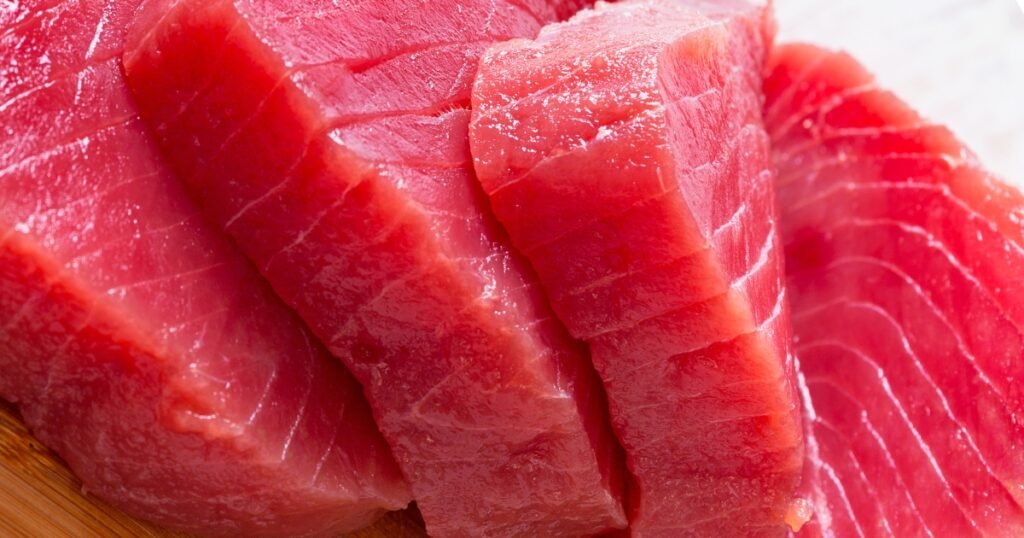
Have you ever found yourself craving a delicious tuna sandwich or dreaming about a perfectly seared tuna steak to lay out on top of your Lion’s Mane Risotto?
It’s not just you; tuna cravings are a real thing. But why do we get them?
We often associate cravings with sweet foods, sweets or junk food, but craving something as specific and nutritious as tuna is a curious phenomenon. As someone who loves exploring the why and how of our food choices, I find the mystery behind these cravings particularly intriguing.
From nutritional benefits to emotional comfort and the unique scenario of pregnancy cravings, there’s a lot to uncover about tuna addiction and our love for tuna. Let’s dive in!
I’m diving into a topic today that’s as intriguing as it is delicious – tuna cravings. I’ve often wondered why this particular fish swims so frequently into our cravings. Is it the rich, savory flavor, or is there more beneath the surface?
We’re not just talking recipes here (though I might slip in a cooking tip or two); we’re going deep into the ‘why’ behind those tuna craving temptations.
For the expecting moms out there, I’ve focused on pregnancy-related tuna cravings – a fascinating blend of biology and culinary delight. So, grab a fork (or a notepad and maybe a side pot of rice), and let’s dive into this ocean of flavor and facts!
Table of Contents
Why Am I Craving Tuna?
I hope you’re ready because we’re about to deep-sea dive and explore the multifaceted world of tuna cravings. From tuna’s flavor to the nutritional beckoning of this sea treasure to its mysterious call during pregnancy, there’s a lot to unpack.
The 7 Reasons Why People Crave Tuna
Nutritional Deficiency: Sometimes, our bodies are smarter than we credit them. Craving tuna can be a sign that your body is seeking out nutrients it’s lacking. Tuna is a powerhouse of essential nutrients, including omega-3 fatty acids, high-quality protein, selenium, and Vitamin D. If you’re not getting enough of these through your regular diet, your body might start nudging you towards that tuna salad.
Omega-3 Fatty Acids: Speaking of omega-3s, these are crucial for our brain health and mood regulation. If you’re feeling a bit down or your brain feels like a fog, your body might crave tuna as a natural way to boost your mood and mental clarity.
Dietary Changes or Restrictions: Have you ever switched up your diet and suddenly found yourself craving foods you never thought much about? If you’ve recently gone low-carb or keto or just tried to eat healthier, your body might respond by craving high-protein, nutrient-rich foods like tuna. It’s your body’s way of balancing the scales.
Emotional Eating: We’ve all been there – reaching for comfort foods during stress or emotional upheaval. Tuna, particularly in familiar forms like a warm casserole or a comforting sandwich, can be a go-to for emotional comfort.
Pregnancy-Related Cravings: Ah, the mysteries of pregnancy cravings! Hormonal changes during pregnancy can do interesting things to taste and smell sensitivities, leading to specific and sometimes unusual food cravings. With its rich flavor and nutrient profile, tuna fish is a common craving among pregnant women. But more on this later – it’s a topic worth its own spotlight.
Personal Taste and Texture Preferences: Sometimes, it’s as simple as just loving the taste and texture of tuna. Whether it’s the smooth, buttery texture of a tuna steak or the versatility of canned tuna, personal preference plays a significant role in our food cravings. If tuna ticks all the right boxes for your palate, cravings will follow.
External Influences: We can’t overlook the power of suggestion. From mouth-watering commercials to seeing a delicious tuna dish on social media, external factors can plant a craving in our minds. It’s like seeing someone enjoying a tuna sushi roll; nothing else will suddenly satisfy you.
Craving Tuna While Pregnant
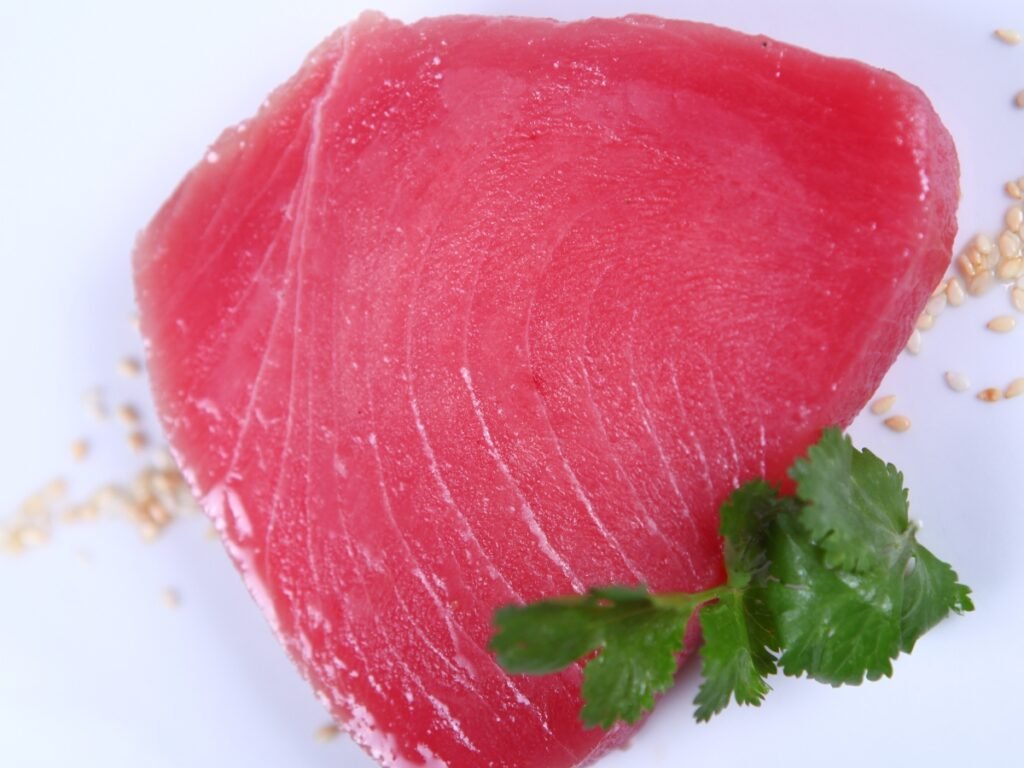
Pregnancy is a time of significant change, including taste preferences and food cravings. Why am I craving tuna during pregnancy? It’s a common question, and here’s why you can’t stop craving tuna:
Nutritional Needs: During pregnancy, the body’s nutritional needs skyrocket. Tuna is a fantastic source of omega-3 fatty acids essential for the baby’s brain development. It’s also rich in protein, vital for the baby’s growth, and contains other nutrients like Vitamin D and selenium.
Hormonal Fluctuations: Pregnancy hormones can play havoc with taste and smell. Foods that were once off-putting might suddenly become appealing, and vice versa. These hormonal changes can explain why some pregnant women suddenly like or crave tuna.
Iron Deficiency: Pregnant women often need more iron; tuna is a good source. If you’re low on iron, your body might start hinting that it’s time for a tuna sandwich.
Mood Regulation: Essential amino acids in tuna are good for the baby and help regulate mood. Pregnancy can be an emotional rollercoaster, and craving foods that help stabilize mood is not uncommon.
A Search for Variety: Pregnancy can sometimes bring a desire for different textures and flavors, and tuna fits the bill perfectly. It’s versatile enough to be enjoyed in many forms – from salads to steaks to sushi-style preparations.
However, it’s important to note that while craving tuna offers many benefits, it also contains mercury, which can be harmful in high amounts.
Pregnant women are advised to eat low-mercury tuna (like canned light tuna) and limit their consumption to a few servings per week.
Health Benefits of Tuna
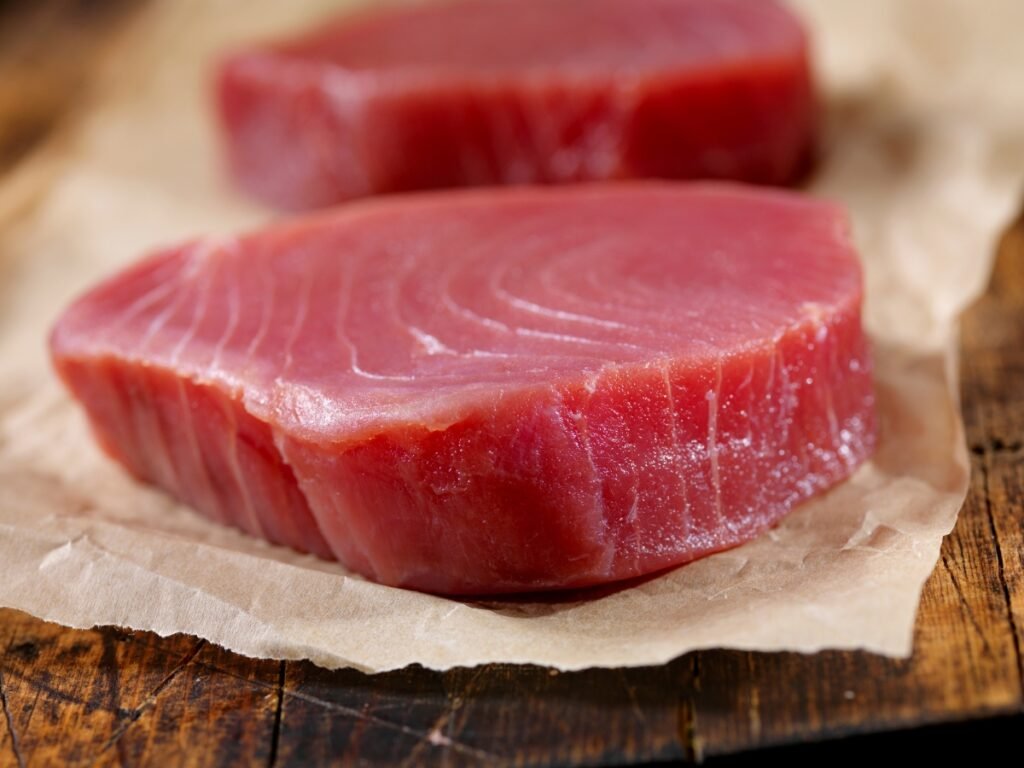
Tuna isn’t just delicious; it’s also a powerhouse of nutrition and essential fatty acids. Here’s a look at some of the key health benefits this versatile seafood offers:
Rich in Omega-3 Fatty Acids: Tuna is an excellent source of omega-3 fatty acids essential for heart health. They help reduce cholesterol levels, lower blood pressure, and decrease the risk of heart disease. Plus, they’re great for brain health, aiding in cognitive function and mental clarity.
High-Quality Protein: Tuna is packed with high-quality protein crucial for muscle building and repair. It’s a great post-workout meal choice for fitness enthusiasts and can be an important part of a balanced diet for anyone looking to maintain muscle mass.
Low in Calories and Fat: Despite being rich in nutrients, tuna is relatively low in calories and fat, making it an excellent choice for those on a weight management journey. It’s filling, satisfying, and can be a part of various healthy meals.
Rich in Vitamins and Minerals: Tuna is a good source of several vitamins and minerals, including vitamin D, vitamin B vitamins, selenium, and phosphorus. These nutrients are important for bone health, energy levels, and well-being.
Supports Immune System: The selenium in tuna is an antioxidant that helps boost the immune system. Eating tuna can help your body fight off illness and keep you feeling healthy and strong.
Mental Health Benefits: The omega-3 fatty acids in tuna aren’t just good for physical health; they also play a role in mental health. They can help reduce symptoms of depression and anxiety and improve mood overall.
Versatility for Healthy Diets: Tuna fits well into many dietary plans, including keto, paleo, and Mediterranean diets. Its versatility in cooking – from salads to grilled steaks – makes it easy to include in a healthy eating regimen.
Potential Risks of Tuna Consumption

When you regularly eat canned tuna, it is undoubtedly nutritious and offers numerous health benefits; it’s also important to be aware of some potential risks associated with eating too much tuna.
Here’s what you need to know to consume tuna safely:
Mercury Content: The primary concern with tuna is its mercury content and consuming too much mercury. Larger and older tuna tend to accumulate more mercury, a heavy metal that can be highly harmful, especially to pregnant women and young children. To minimize the risk of mercury poisoning, opt for smaller species like skipjack (often used in canned light tuna) rather than larger species like albacore (white tuna) and bigeye.
Safe Consumption Guidelines: Consuming tuna in moderation is recommended. This means enjoying up to two to three servings weekly for most adults. Pregnant and breastfeeding women are advised to limit their intake to avoid potential mercury exposure to the fetus or infant.
Allergic Reactions: Some individuals may be allergic to fish, including skipjack tuna. Symptoms of a fish allergy can range from mild reactions, like hives or a stuffy nose, to more severe ones, like anaphylaxis. If you suspect a fish allergy, it’s important to consult a healthcare provider.
Risk of Overfishing: Environmental concerns surround tuna, particularly overfishing and sustainability. Choosing tuna certified as sustainable by organizations like the Marine Stewardship Council (MSC) can help ensure you make environmentally responsible choices.
Quality and Preparation: The quality of tuna and its preparation can also impact its safety. Eating raw or undercooked tuna (like in sushi) poses a risk of bacterial or parasitic infections. Always ensure that the tuna is fresh and properly handled, especially if consuming it raw.
Remember, the key is moderation and informed choices. Tuna can be a fantastic addition to a balanced and varied diet, offering a range of nutrients that support overall health.
Conclusion: Understanding Your Tuna Cravings
So, why are you craving tuna? As we’ve seen, there are numerous reasons behind these cravings. It could be your body signaling a need for specific nutrients like omega-3 fatty acids, protein, selenium, or Vitamin D.
Perhaps it’s a response to dietary changes, emotional comfort, or simply a reflection of your personal taste preferences. And for expecting mothers, those cravings might be tied to the unique nutritional needs and hormonal changes of pregnancy.
Tuna isn’t just a tasty treat; it’s a nutritionally dense food with numerous health benefits. It’s a versatile and beneficial part of any diet, from supporting heart and brain health to aiding muscle building and boosting mood.
However, it’s important to be mindful of the potential risks, especially mercury content. Moderation is key, along with choosing the right type of tuna and being aware of any personal allergies or dietary restrictions.
Whether it’s a nutritional signal from your body, a quest for comfort food, or just a love for its flavor and texture, your craving for tuna is more than just a simple desire – it’s a fascinating journey into the needs and workings of your body and mind.
Embrace your cravings with an understanding of what they might mean and how best to satisfy them in a healthy, balanced way.
FAQ and Additional Information
Craving Tuna Before Period
Craving tuna before your period is quite an interesting phenomenon, and it can be attributed to several factors related to your menstrual cycle:
Nutritional Needs: Before and during your period, your body undergoes significant hormonal changes that can affect your dietary needs. Rich in iron and B vitamins, Tuna can help replenish nutrients often depleted during menstruation.
Iron is particularly important since it helps compensate for the iron loss due to menstrual bleeding. The B vitamins in tuna, especially B6, can also aid in reducing menstrual symptoms like bloating and mood swings.
Craving for Protein and Healthy Fats: Hormonal fluctuations can also increase your body’s demand for protein and healthy fats, which are abundant in tuna. Protein can help keep your energy levels steady, while omega-3 fatty acids can play a role in alleviating mood swings and cramps.
Comfort Eating: Cravings are sometimes driven by a need for comfort, especially during stress or discomfort, including the premenstrual phase. Tuna, particularly when prepared in familiar and comforting ways (like a tuna salad or sandwich), can provide a sense of solace.
Magnesium Levels: Tuna is a good source of magnesium, a mineral that some women crave before their period. Magnesium can help with premenstrual symptoms like cramps, headaches, and irritability.
Sodium Levels: Cooking canned tuna might also respond to your body’s desire for more sodium, as canned tuna often contains salt. Before menstruation, some women experience a drop in sodium levels, which the body tries to balance by craving salty foods.
If you’re craving tuna before your period, indulging in moderation is generally acceptable. However, be mindful of the type of tuna you choose (opt for low-mercury options like canned light tuna) and the quantity to maintain a healthy and balanced diet.
Why does tuna make me feel better?
The feeling of well-being you experience after eating tuna can be attributed to several nutritional factors:
Omega-3 Fatty Acids: Tuna is rich in omega-3 fatty acids known for their mood-boosting properties. Omega-3s play a critical role in brain health, including mood regulation.
They are thought to increase serotonin levels, a neurotransmitter often referred to as the “happiness hormone,” which can help improve your mood and bring about feelings of relaxation and positivity.
High-Quality Protein: Tuna is an excellent source of high-quality protein. Proteins are essential for the proper functioning of your body, including the production of neurotransmitters that regulate mood.
Eating a protein-rich food like tuna can help stabilize blood sugar levels, preventing the spikes and crashes that can affect your mood and energy levels.
B Vitamins: Tuna is also a good source of B vitamins, particularly Vitamin B12 and niacin. These vitamins play a vital role in brain function and are linked to improved mood and reduced symptoms of depression and anxiety.
Vitamin B12 is crucial for maintaining nerve cells’ health and DNA and RNA production.
Vitamin D: Some types of fish species and tuna are a source of vitamin D, a nutrient important for bone health and linked to mood regulation.
Low levels of Vitamin D have been associated with an increased risk of mood disorders, including depression and anxiety.
Selenium: This is a mineral found in tuna that has antioxidant properties. Selenium can help reduce oxidative stress in the body, which benefits overall mental health and well-being.
Iron and Magnesium: Tuna contains iron and magnesium, which are important for energy production and mood regulation.
Iron is crucial for preventing anemia, which can cause fatigue and mood changes, while magnesium has a calming effect on the nervous system.
Blood Sugar Regulation: The combination of protein and healthy fats in tuna can help maintain stable blood sugar levels.
Fluctuations in blood sugar can impact mood and energy levels, so consuming foods that help regulate blood sugar can produce a more balanced feeling.
Satisfying and Comforting: Besides the biochemical effects, eating something you enjoy, like a delicious tuna dish, can be psychologically satisfying and comforting.




